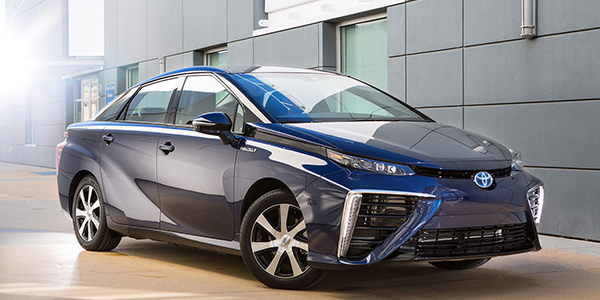With Washington’s first hydrogen production facility slated to be built in his district, a state legislator has introduced a bill to create tax exemptions for hydrogen fuel cell electric vehicles.
The bill (SB 5000) by state Sen. Brad Hawkins (R) to apply a partial sales tax exemption to hydrogen FCEVs appears to be sailing through the Senate with overwhelming bipartisan support. Three committees have recommended passage, and the bill faces a full Senate floor vote any day. If passed, the bill would go to the House of Representatives. Opposition in Olympia has been almost nonexistent.
The production of hydrogen is carbon-free when the fuel is sourced from water and the process is powered by emissions-free resources. Exhaust from a hydrogen FCEV is a trickle of water from the tailpipe and a wisp of steam.
Hawkins’ bill would set up an eight-year pilot program in which the 6.8% state sales tax on cars would be cut in half for the first 650 hydrogen FCEVs sold in Washington. Prices for the cars range from $34,000 to $58,000, according to manufacturers’ figures. After eight years, the exemption would be reevaluated. The exemptions would apply only to new vehicles.
Hawkins is not aware of any hydrogen FCEVs being sold so far in Washington. However, a Kenworth manufacturing plant in the Seattle suburb of Renton has built a handful of fuel cell semi-trucks earmarked for use in California with hydrogen cells from Toyota Mirai cars. A legislative memo said Washington has almost 64,000 conventional electric vehicles.
Hawkins represents a legislative district in central Washington crossed by the Columbia River, which supports an extensive network of hydroelectric dams. His district includes the Douglas County Public Utility District, owner and operator of the 840-MW Wells Dam.
The PUD plans to use electricity and water from that dam to power a proposed plant to create hydrogen from reservoir water. That project’s origin comes from a 2019 Hawkins bill signed into law that allows Washington PUDs to manufacture and distribute hydrogen.
Construction of that $20 million hydrogen plant is scheduled to begin this spring and be finished by November, Douglas County PUD official Gary Ivory told the House Transportation Committee on Feb. 18. The plant is expected to produce two tons of hydrogen a day. “We hope to expand the plant if there is an adequate demand,” he said.
In an interview, Hawkins said: “It is really a big opportunity.”
Hawkins envisions central Washington with its many dams becoming a center of producing hydrogen fuel cells for cars. He said that electric vehicles are slowly becoming more numerous and noted that a hydrogen fuel cell can be refueled in a few minutes, while using an electric charging station can take hours to fully recharge a standard electric vehicle.
Washington does not have any hydrogen fuel cell stations. Hawkins described the co-dependency of hydrogen FCEVs and fueling stations as a “what-came-first-the-chicken-or-the-egg” situation. He said that one hydrogen fueling station is planned for southwestern Washington. Hawkins hopes the Washington legislature’s biennial transportation-funding package — to be tackled later this session — will include two hydrogen stations for his legislative district.
He argued that his agriculture-heavy district — which is the nation’s leading grower of apples — is well suited to combine hydrogen fuel stations with hydrogen-fueled trucks serving the area’s farms.
“North-central Washington is as well positioned as any region in the United States to lead the use of hydrogen” in vehicles, Hawkins said.




